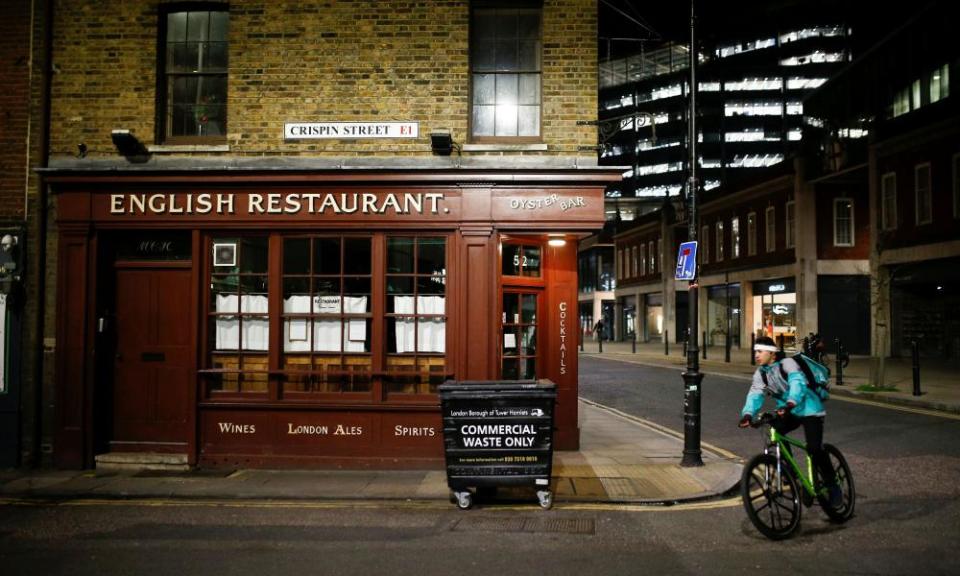UK’s growing army of night workers ‘need rest centres’ for sanctuary

Food delivery drivers, sex workers and cleaners must have easy access to staff rooms, toilets and canteens, says thinktank
All-night city rest centres – with staff rooms, canteens and toilets – would provide food-delivery drivers, sex workers and cleaners with “dignity” and shelter from bad weather, a thinktank has said.
In a new report, Autonomy called on employers to work with local authorities to fund safe spaces for workers to visit at night between shifts and during quiet periods.
The rapid rise of the gig economy has left many workers without easy access to staff rooms, toilets, and opportunities to meet each other. With an increasing reliance on home deliveries due to pandemic restrictions, there are particular concerns over the treatment of drivers, who are often foreign nationals of colour working zero-hour contracts.
Many fast-food delivery drivers congregate on city streets near busy pick-up zones in between shifts and for breaks, where they can be exposed to poor weather and aggressive passersby. Some are ordered to wait hundreds of metres away from restaurants until the order is ready.
The report found that one-in-nine employees in the UK now work at night, the highest proportion since records began. Many are denied equal access to services available to daytime workers, such as childcare, healthcare and common indoor facilities to relax, store belongings, access healthy food and use the toilet.
These services would be provided in the rest centres funded by employers but “autonomously” operated, and the measures would help “revert the exploitation of night-time workers and democratise the night-time economy,” the report said.
Will Stronge, director of research at Autonomy, said: “The UK has witnessed an explosion of precarious gig economy night-time work but without any infrastructure put in place to cater for these workers. The pandemic has shone a spotlight on unfair and precarious working practices and night-time workers are suffering from a basic lack of dignity with nowhere to go at night.”
A delivery driver in London told the Observer that couriers can face harassment on the streets and that rest centres could provide sanctuary.
“Everyone wants food delivered but there’s nowhere for us to go,” he said on condition of anonymity due to fears of losing work. “We don’t just blink out of existence when we’re not delivering. I have a pregnant wife and two kids at home depending on me standing out in the cold.”
However, he said food outlets also had to fundamentally change the way they treat drivers. “Some restaurants won’t allow us to wait inside and will make us wait outside in the cold and the rain,” he said. “That’s not respect.”
A spokesperson for the Independent Workers Union of Great Britain said that food delivery app companies have transformed the landscape of work in recent years, and suggested it has led to a degradation of standards for workers. “They have not provided any kind of infrastructure to accommodate their workers, and riders have been made to bear all the responsibility for the difficulties of constantly working in public space,” he said.
Night work is more precarious than day work, and the report said that workers on zero-hour contracts are twice as likely to work night shifts than other workers. In London, twice as many workers in the night time economy earn below the city’s living wage compared with daytime occupations, it added.
“24-hour rest centres would provide safety and respite for night-time workers, and the mayor of London, Sadiq Khan, should work with night-time employers to introduce them in London,” Stronge added.

 Yahoo Finance
Yahoo Finance 